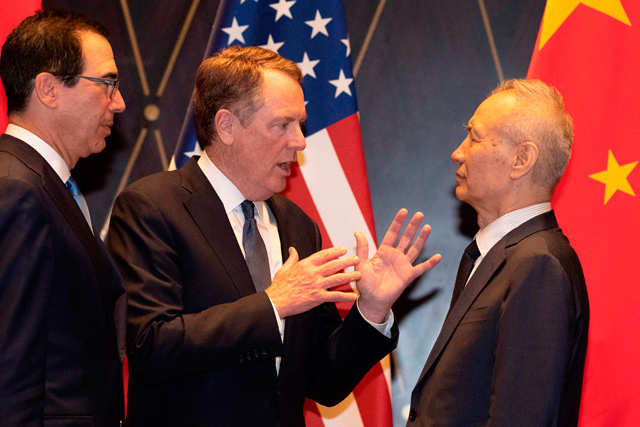SHANGHAI — US and Chinese negotiators agreed to meet again in the United States in September after holding "frank" and "constructive" talks in Shanghai on Wednesday, state media said following meetings overshadowed by a Twitter tirade from President Donald Trump.
US Treasury Secretary Steven Mnuchin and Trade Representative Robert Lighthizer met with Vice Premier Liu He in the Chinese financial hub for the first face-to-face negotiations since a trade war truce was declared last month.
"The two sides conducted frank, highly efficient and constructive in-depth exchanges on major issues of common interest in the economic and trade field," according to the official Xinhua news agency, adding that the purchase of US agricultural goods by China was discussed.
Washington and Beijing have so far hit each other with punitive tariffs covering more than $360 billion in two-way trade in a row centred on demands for China to curb the alleged theft of American technology and provide a level playing field to US companies.
The negotiators shook hands and exchanged pleasantries when they met Wednesday morning and then held talks for around four hours behind closed doors.
The talks were relatively brief and the negotiators emerged later, a little earlier than expected, for a group photo before the US trade officials left for the airport without speaking to reporters.
Agricultural goods
Talks had broken down in May after Trump accused China of reneging on its commitments, but the US leader and President Xi Jinping agreed to a truce in June.
Lighthizer and Mnuchin had arrived on Tuesday and joined Chinese officials for dinner and informal discussions — just as Trump lambasted the Chinese side on Twitter, saying "they always change the deal in the end to their benefit".
The US leader said Beijing was supposed to start buying US agricultural products but they had shown "no signs that they are doing so".
Xinhua said on Wednesday the negotiators discussed "the issue of China increasing its purchases of US agricultural products according to its domestic needs" and the US creating "favourable conditions for these purchases".
Commerce Minister Zhong Shan, who is considered a tough negotiator and who has taken a more prominent role in the talks, was among the Chinese officials at the meeting.
"The two sides will hold the next round of high-level economic and trade consultations in the United States in September," Xinhua said.
Jake Parker, senior vice president at the US-China Business Council, said: "We are pleased the two sides agreed to move forward with agriculture purchases to provide some much needed relief to American farmers."
"We hope the negotiators will continue to take a pragmatic and realistic approach to compromise and reach a conclusion that leads to greater market access for foreign companies, improves the protection and enforcement of intellectual property, and ultimately levels the playing field for foreign companies operating in the market," Parker added.
'Rip off the USA'
Hours after Trump's tweets, a commentary in the Communist Party mouthpiece People's Daily on Wednesday complained that as the talks started, "the drums of some Americans struck again on the side, disturbing the main melody".
At a press briefing in Beijing on Wednesday, a foreign ministry spokeswoman made it clear which side China saw as responsible for the ongoing trade impasse.
"When one is ill it is useless to ask someone else to take the medicine," said Hua Chunying, when asked about the talks wrapping up in Shanghai.
"I believe the US should show more sincerity and good faith when it comes to trade negotiations."
Days before the Shanghai meeting, Trump threatened to pull recognition of China's developing nation status at the World Trade Organisation, which Beijing called "arrogance".
Expectations were already low before the talks, and officials on both sides were keeping a low profile throughout their Shanghai trip.
US trade negotiators entered and left their hotel on Shanghai's waterfront through side doors without going through public areas, and did not stop to speak to press or show their faces.
Trump suggested on Tuesday that Beijing was hoping to delay a deal until after the US presidential election in November 2020, saying China wanted to see if a Democratic opponent wins the vote so it could "continue to rip off the USA".
But Trump also warned that "if & when I win, the deal that they get will be much tougher than what we are negotiating now ... or no deal at all".
"He [Trump] can't afford politically to step up and say 'I made a great deal with China' when it's not a great deal," said Derek M. Scissors, resident scholar at the American Enterprise Institute.
"So the most likely outcome is we get nothing until the election."
